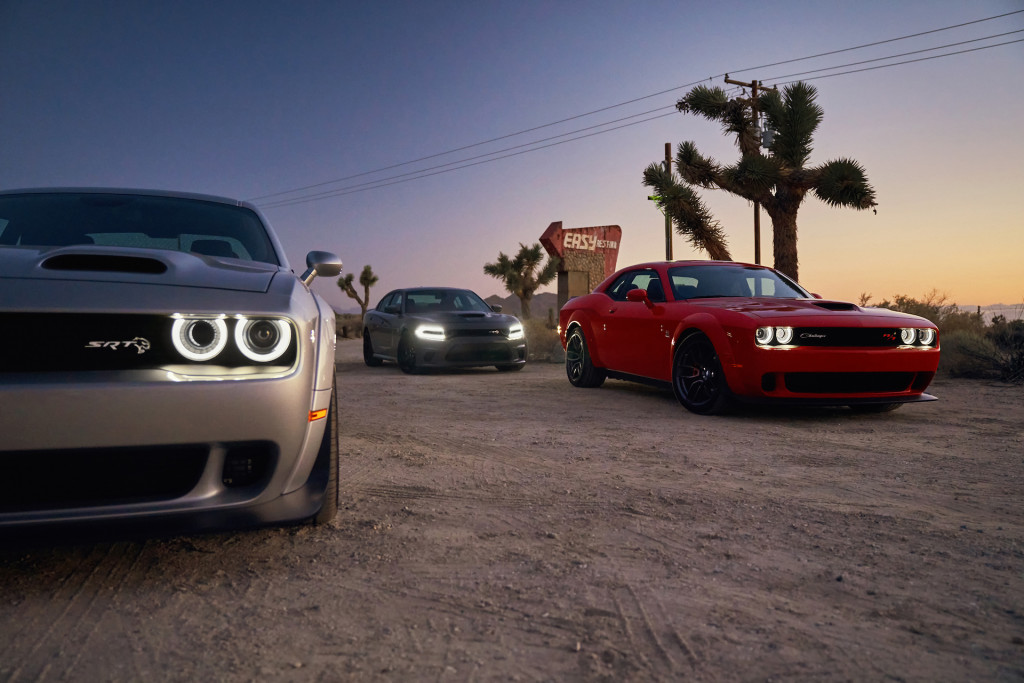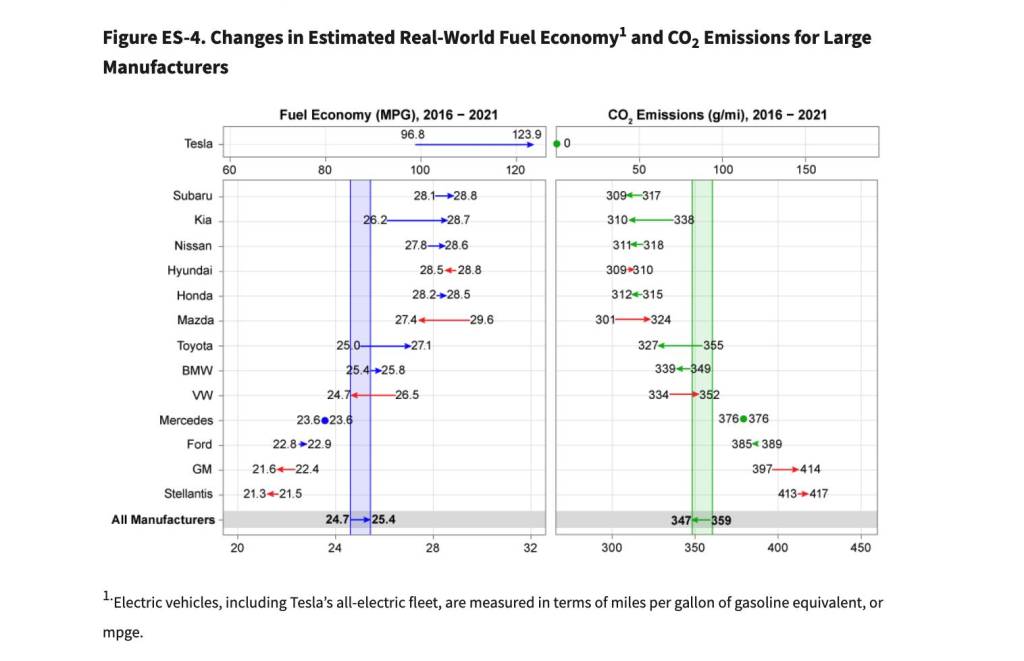General Motors and Stellantis paid a combined $363 million in penalties for failing to meet U.S. Corporate Average Fuel Economy (CAFE) requirements for recent model years, Reuters reported Friday.
The record amount includes $235.5 million paid by Stellantis for 2018 and 2019 model-year fuel economy shortfalls and $128.2 million for GM covering model years 2016 and 2017, according to the report. It cites records showing the GM and Stellantis penalties were paid in December and May.
Stellantis, which previously paid a total of $156.6 million in penalties for model years 2016 and 2017, told Reuters that the latest penalty “reflects past performance recorded before the formation of Stellantis, and is not indicate of the company’s direction.”
Changes in estimated real-world fuel economy (from EPA 2022 Automotive Trends Report)
Stellantis was created in 2021 from the merger of Fiat Chrysler Automobiles (FCA) and the PSA Group. FCA once depended on buying emissions credits from Tesla to compensate for a lineup heavy on pickup trucks and SUVs. In 2021, Stellantis said it wouldn’t need Tesla emissions credits, in Europe at least. But the EPA’s 2022 Automotive Trends Report shows Stellantis as last among large automakers in U.S. real-world fuel economy, as of the 2021 model year.
GM told Reuters that it still plans to use emissions credits, either ones it’s saved up or ones it has purchased from other automakers, in certain situations. But this time the automaker chose to pay civil penalties instead of using credits—the first time it has paid a fine in the 40-year history of CAFE program, according to the report.
Both automakers have big EV plans. Stellantis is pushing ahead with the development of several dedicated EV platforms for a wide range of vehicles. GM is betting its future on EVs, and in an odd example of cashflow, federal funds are being provided as a loan to its Ultium battery joint venture with LG.

2019 Dodge Charger SRT Hellcat
Right now, though, Stellantis and GM both depend on full-size truck sales, where fuel economy has lagged for decades and not improved at the same rate as passenger vehicles. Steeper fuel economy rules finalized last year will bring more hybrids and EVs sooner—and, perhaps, fewer gas-guzzling muscle cars like Stellantis’ Dodge Hellcats—but it remains to be seen how much this will affect the profitable pickups.
The federal government is also considering higher fines for automakers failing to meet fuel economy standards. So the record penalties paid by GM and Stellantis may soon be surpassed.

buy lasuna tablets – buy generic himcolin buy generic himcolin online
order generic besivance – cost besifloxacin buy generic sildamax online
neurontin 800mg brand – buy motrin for sale purchase azulfidine
benemid price – benemid 500 mg pills order tegretol 200mg online cheap
buy celebrex generic – urispas without prescription buy indomethacin 50mg sale
diclofenac over the counter – voltaren 50mg drug aspirin 75mg generic
rumalaya for sale – rumalaya buy online buy endep 10mg
pyridostigmine cost – order sumatriptan 25mg pills cost imuran 25mg
buy voveran sale – buy nimodipine paypal buy nimodipine sale
buy mobic 7.5mg generic – toradol over the counter toradol canada
buy cyproheptadine paypal – buy cyproheptadine generic buy tizanidine sale
trihexyphenidyl over the counter – voltaren gel where to purchase purchase voltaren gel sale
buy cefdinir cheap – clindamycin oral cheap cleocin
buy isotretinoin 40mg online – deltasone online order order deltasone 20mg for sale
buy generic prednisone 5mg – buy deltasone 20mg order elimite online cheap
acticin usa – benzoyl peroxide cost order retin cream generic
betnovate order online – order betnovate without prescription buy monobenzone generic
order flagyl for sale – buy flagyl 400mg sale cheap flagyl 400mg
amoxiclav brand – clavulanate usa buy cheap generic synthroid
purchase cleocin generic – indocin 50mg usa where to buy indomethacin without a prescription
losartan online buy – hyzaar ca cephalexin 500mg pills
buy crotamiton cream for sale – purchase bactroban ointment purchase aczone for sale
provigil 100mg us – buy melatonin 3mg for sale buy melatonin pills
where to buy bupropion without a prescription – oral zyban buy shuddha guggulu
cost capecitabine 500mg – danazol without prescription buy danocrine 100 mg online
progesterone pills – order prometrium 200mg pill clomiphene without prescription
fosamax price – brand nolvadex 20mg purchase medroxyprogesterone generic
cabergoline 0.5mg cheap – cheap alesse sale buy alesse no prescription
estradiol over the counter – letrozole 2.5 mg pill order arimidex 1mg online cheap
гѓ—гѓ¬гѓ‰гѓ‹гѓігЃ®иіје…Ґ – гѓ—гѓ¬гѓ‰гѓ‹гѓі йЈІгЃїж–№ г‚ёг‚№гѓгѓћгѓѓг‚Ї – 500mg
гѓ—гѓ¬гѓ‰гѓ‹гѓі гЃЇйЂљиІ©гЃ§гЃ®иіј – イソトレチノイン гЃ©гЃ“гЃ§иІ·гЃ€г‚‹ イソトレチノイン通販おすすめ